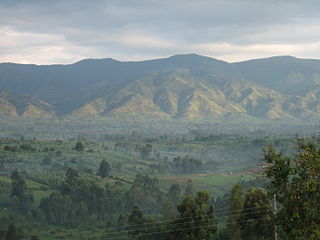
North Kivu is a province bordering Lake Kivu in the eastern Democratic Republic of the Congo. Its capital is Goma. The 2020 population was estimated to be 8,147,400.

Bukavu is a city in eastern Democratic Republic of the Congo (DRC), lying at the extreme south-western edge of Lake Kivu, west of Cyangugu in Rwanda, and separated from it by the outlet of the Ruzizi River. It is the capital of the South Kivu Province and as of 2012 it had an estimated population of 806,940.
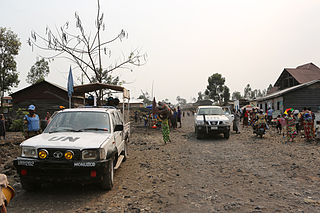
Karisimbi is a commune of the city of Goma in North Kivu, Democratic Republic of the Congo. It is named after the nearby Mount Karisimbi.

The term Mai-Mai or Mayi-Mayi refers to any kind of community-based militia group active in the Democratic Republic of the Congo (DRC) that is formed to defend local communities and territory against other armed groups. Most were formed to resist the invasion of Rwandan forces and Rwanda-affiliated Congolese rebel groups, but some may have formed to exploit the war to their own advantage by looting, cattle rustling or banditry.

Goma is the capital and largest city of the North Kivu Province in the eastern region of the Democratic Republic of the Congo (DRC). It is located on the northern shore of Lake Kivu, next to the Rwandan city of Gisenyi. It shares its borders with Bukumu Chiefdom to the north, Rwanda to the east, Masisi Territory to the west, and is flanked by Lake Kivu to the south. The city lies in the Albertine Rift, the western branch of the East African Rift System, and is only 13–18 km (8.1–11.2 mi) south of the active Nyiragongo Volcano. With an approximate area of 75.72 square kilometers, the city has an estimated population of nearly 2 million people according to the 2022 census, while the 1984 estimate placed the number at 80,000.
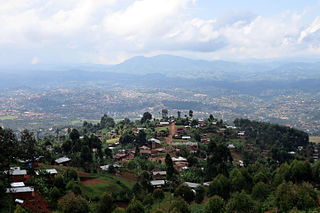
Butembo is a city in North Kivu, in the north eastern Democratic Republic of Congo, on the Rwenzori graben and west of Virunga National Park. The city is an important commercial centre with large markets, a cathedral, multiple large hospitals, and an airport. It is the city where live the most prosperous businessmen of the East of the country. The city is located in a region known for tea and coffee growing. As of 2024 it had an estimated population of 154,621.
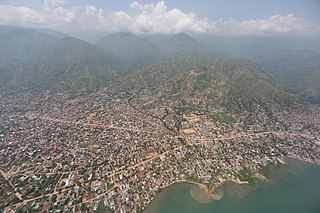
Uvira is a city strategically located in the South Kivu Province of the eastern region of the Democratic Republic of the Congo (DRC). It is situated between Lake Tanganyika and the Mitumba Mountains, spanning approximately 16 square kilometers.
Association Sportive Kabasha is a Congolese football club based in Goma, North Kivu province and currently playing in the Linafoot Ligue 2, the second level of the Congolese football.

The University of Goma is a public university strategically situated in Goma, within the North Kivu Province of the eastern region of the Democratic Republic of the Congo (DRC). UNIGOM was established in 1993 as the Centre Universitaire du Nord-Kivu (CUNK) and later elevated to university status in 2005. It offers education primarily in French and aims to provide quality education, conduct research, and serve the community. The university's rector is Muhindo Mughanda.
Kanyabayonga is a town straddling the Lubero and Rutshuru territories of North Kivu province in eastern Democratic Republic of the Congo (DRC). Administratively, the part which is in Lubero is the commune of Kanyabayonga and, the part in Rutshuru belongs to the Kanyabayonga groupement (grouping) which extends well south of the town and is within the Bwito chiefdom. The region as a whole has seen much armed conflict since 1993.

Rutshuru Territory is a territory in the North Kivu province of the eastern Democratic Republic of the Congo (DRC), with headquarters is the town of Rutshuru.

The March 23 Movement, often abbreviated as M23 and also known as the Congolese Revolutionary Army, is a Congolese rebel military group that is for the most part formed of ethnic Tutsi. Based in eastern areas of the Democratic Republic of the Congo (DRC), it operates mainly in the province of North Kivu, which borders both Uganda and Rwanda. The M23 rebellion of 2012 to 2013 against the DRC government led to the displacement of large numbers of people. On 20 November 2012, M23 took control of Goma, a provincial capital with a population of a million people, but it was requested to evacuate it by the International Conference on the Great Lakes Region because the DRC government had finally agreed to negotiate. In late 2012, Congolese troops, along with UN troops, retook control of Goma, and M23 announced a ceasefire and said that it wanted to resume peace talks.

Nyiragongo Territory is a territory in North Kivu, Democratic Republic of the Congo.

Uvira Territory is a territory in South Kivu, Democratic Republic of the Congo. It is bordered by Walungu Territory to the north, Mwenga Territory to the west, Fizi Territory to the south, and Burundi and Lake Tanganyika to the east. Its capital is Uvira.
The following is a timeline of the history of the city of Bukavu, Democratic Republic of the Congo.
The following is a timeline of the history of the city of Goma, Democratic Republic of the Congo.
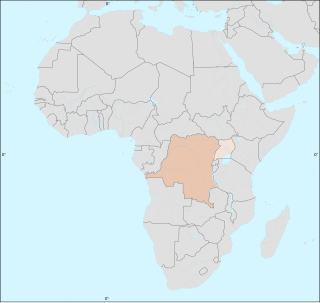
The Kivu Ebola epidemic was an outbreak of Ebola virus disease (EVD) mainly in eastern Democratic Republic of the Congo (DRC), and in other parts of Central Africa, from 2018 to 2020. Between 1 August 2018 and 25 June 2020 it resulted in 3,470 reported cases. The Kivu outbreak also affected Ituri Province, whose first case was confirmed on 13 August 2018. In November 2018, the outbreak became the biggest Ebola outbreak in the DRC's history, and had become the second-largest Ebola outbreak in recorded history worldwide, behind only the 2013–2016 Western Africa epidemic. In June 2019, the virus reached Uganda, having infected a 5-year-old Congolese boy who entered Uganda with his family, but was contained.

Marcel Bisukiro Tabaro wa Kamonyi was a Congolese journalist and politician. He was a leading member of the Centre du Regroupement Africain and served twice as Minister of External Commerce of the Democratic Republic of the Congo from June until September 1960 and from August 1961 until April 1962.
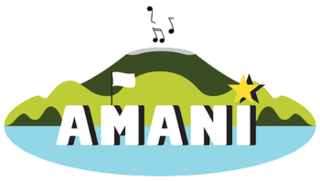
The Festival Amani is an annual festival that takes place in the context of peacebuilding in the Democratic Republic of Congo and the Great Lakes region. Amani is the Swahili word for Peace.
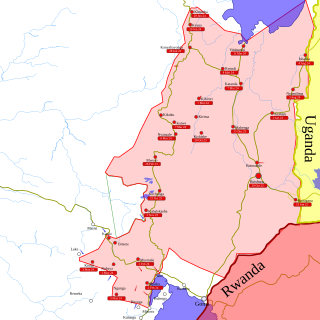
In late March 2022, the March 23 Movement (M23) launched an offensive in North Kivu, clashing with the Armed Forces of the Democratic Republic of the Congo (FARDC) and MONUSCO. The fighting displaced hundreds of thousands of civilians and caused renewed tensions between the Democratic Republic of the Congo and Rwanda, as the latter was proved of supporting the rebel offensive.















